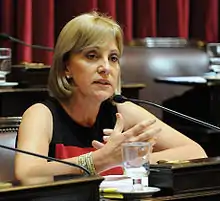Liliana Fellner | |
|---|---|
 | |
| National Senator | |
| In office 10 December 2005 – 10 December 2017 | |
| Constituency | Jujuy |
| National Deputy | |
| In office 10 December 2003 – 10 December 2005 | |
| Constituency | Jujuy |
| Personal details | |
| Born | 28 February 1957 San Salvador de Jujuy, Jujuy Province, Argentina |
| Political party | Kolina Front for Victory (2003–2017) |
Liliana Beatriz Fellner (born 28 February 1957[1]) is an Argentine politician. She was a National Senator representing Jujuy Province from 2005 to 2017, and a National Deputy elected in the same province from 2003 to 2005.
She is a member of the Kolina party, founded by Alicia Kirchner.[2]
Career
Fellner received a diploma in biochemistry in 1982 from the National University of Tucumán and among other postgraduate courses gained her Masters in Administration at the Instituto Populorum Progressio in San Salvador de Jujuy. She worked at the National University of Tucumán and the National University of Jujuy and at research institutes.
In 1999, Fellner was appointed Secretary of Culture and Tourism for the Province of Jujuy and led the successful bid to list the Quebrada de Humahuaca as a UNESCO World Heritage Site 2002-03.[3] In 2003 she was elected as a national deputy and in 2005 she was elected to the Argentine Senate for Jujuy.
Fellner's brother is Eduardo Fellner, former governor of Jujuy and President of the Chamber of Deputies.[4][5]
References
- ↑ Chamber of Deputies profile, accessed 1 June 2008.
- ↑ "La evaluación de KOLINA de las Legislativas 2013". Todo Jujuy (in Spanish). 6 November 2013. Retrieved 24 December 2020.
- ↑ Mapuche (28 January 2002). "Evalúan declarar a la Quebrada de Humahuaca Patrimonio de la Humanidad" (in Spanish). Retrieved 23 June 2014.
- ↑ "La diputada Liliana Fellner habló sobre la detención de su hermano". Todo Jujuy (in Spanish). 13 April 2018. Retrieved 24 December 2020.
- ↑ Sued, Gabriel (10 November 2016). "La interna peronista, al descubierto en la disputa por un cargo". La Nación (in Spanish). Retrieved 24 December 2020.